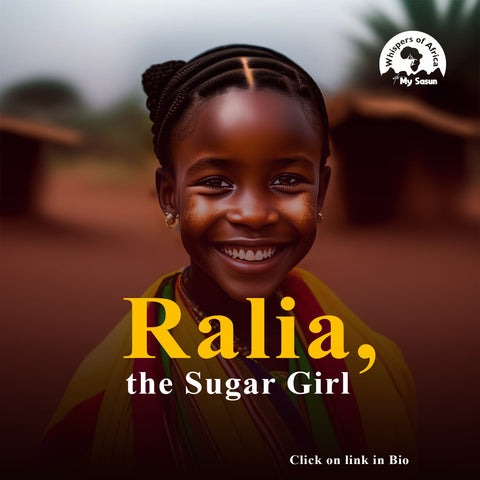In a small village warmed by the sun and full of sugarcanes, there was a girl named Ralia with a voice as sweet as honey. When she sang, she filled the whole village with beautiful melodies. Her laughter was so contagious, but her family had a tough life. Her mother was blind, and her father’s back was bent and so was too weak to work.
One day, Ralia went to the forest to collect firewood, singing as she walked. But soon, she got lost as the forest grew dark and scary. She became very quiet, filled with fear, trying to seek her way out of the forest.
Also Read: THE GREAT RACE OF OLEGBA VILLAGEBut night came and she was still trapped in the forest. As the night became older, Ralia saw a light from a strange, thorny cottage. An old woman with twinkling eyes stood at the door. She was Mama Dada, a witch, who offered Ralia a place to stay but wanted her sweet voice in return.
Ralia agreed, and the witch took her voice, trapping it in the cottage. From that time, the forest and the village became silent without Ralia's songs.
Back home, her parents were worried sick. They looked everywhere, but Ralia was nowhere to be found. The villagers whispered about the witch's curse, and hope was fading.
Ralia's days at the witch's cottage were filled with hardship and toil. The once vibrant girl, known for her sweet voice and laughter, now lived in silence, her song stolen by Mama Dada's cruel magic. The witch had bound Ralia's voice within the walls of her crooked home, and with it, a part of Ralia's spirit seemed to have dimmed.
Each morning, as the first light of dawn crept over the horizon, Ralia was roused from her meager straw bed by the witch's harsh commands. She spent her days performing arduous tasks; scrubbing the soot-stained floors, tending to the gnarled and twisted plants in the witch's garden, and cooking meals from the meager provisions the witch provided. The work was grueling, and her hands, once soft and delicate, became calloused and stained with the earth of the garden.
Also Read: THE STOLEN CUBS AND THE TEAR STAINS OF HONORThe witch, Mama Dada, watched Ralia's every move with hawk-like eyes, ensuring that not a moment was wasted. She took pleasure in reminding Ralia of her voiceless state, often forcing her to attempt to sing, only to mock the silent gasps that followed. The absence of her voice was a constant sorrow, a silent cry that echoed in her heart.
Ralia's only respite came at night when the witch would leave the cottage to wander the forest, engaging in mysterious and dark rituals. It was during these fleeting moments of solitude that Ralia allowed herself to weep for her lost voice and for the parents she feared she would never see again.
Despite the suffering, Ralia's resolve did not waver. She held onto the hope that one day she would reclaim her voice and return to her family. It was this hope that one day led her to discover something one day.
While she was weeding the garden, Ralia found a glowing sugar cane in the witch's garden. She ate some, and suddenly her voice came back! Immediately she realized what had happened, she ran away from the cottage before the witch could wake up.
Also Read: THE LEGEND OF THE SACRED SWANSAs she ran through the dangerous forest, she fell down and passed out. A few hours later, a prince passed by and found her. He was amazed by her beauty and the sweet sound that still hung in the air even though she was unconscious.
The prince took Ralia to his palace. When she woke up, she was surrounded by luxury. Her singing voice charmed everyone. After listening to her story, the prince was impressed by Ralia's bravery that he asked her to marry him. She said yes, as long as her parents were taken care of. The prince, captivated by her resilience and kindness, ensured that her parents were brought to live in the palace, where they were given the care and comfort they deserved.
Ralia's mother received treatment from the finest healers, and though her sight could not be fully restored, she was able to see her daughter's face again, a moment of pure joy that brought tears to all who witnessed it. Ralia's father, with proper nutrition and rest, regained some of his strength and took to teaching the children of the palace the art of storytelling, passing on the tales of their ancestors.
With her voice restored, Ralia's presence brought a newfound vibrancy to the palace. Her songs filled the halls, and her laughter echoed in the gardens, instilling a sense of hope and joy in everyone she met.
As for the witch, Mama Dada, her punishment came from the very magic she wielded. The enchanted sugar cane, a symbol of Ralia's triumph, became a curse for the witch. With each attempt to harm Ralia or her loved ones, the witch's powers waned. The darkness that she had thrived in began to recoil from her, and the creatures of the forest, once her allies, turned their backs.
In the end, Mama Dada was left powerless and alone, a shadow of her former self, wandering the edges of the forest. She became a cautionary tale, a reminder to all of the price of greed and malice. Her name was spoken in hushed tones, a warning to those who dared to walk the path of darkness.
Ralia's life, now full of love, light, and song, was a proof of the enduring spirit of humanity. She and the prince led a just and kind rule, and their legacy lived on for generations, inspiring songs, plays, and stories that celebrated the triumph of goodness over evil.
Also Read: THE HONEYGUIDE'S REVENGE







Comments (3)
This was nostalgic. I enjoyed reading through
My heart is so filled with joy. If you are suffering from Erectile dysfunction or any other disease you can contact Dr. Moses Buba on this buba.herbalmiraclemedicine@gmail.com or His website : https://www.facebook.com/profile.php?id=61559577240930 . For more information from me reach me via WhatsApp : +44 7375 301397
Good work